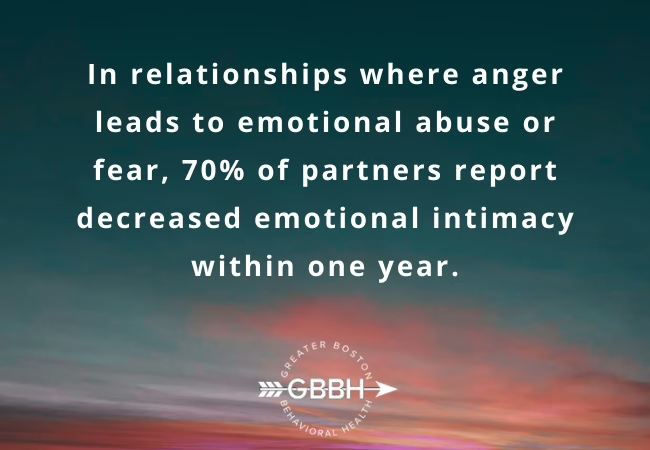Relationships are built on trust, communication, and emotional safety. When anger becomes a dominant force, it can slowly corrode these foundations—leading to arguments, resentment, fear, emotional withdrawal, or even complete breakdown. But here’s the truth: anger itself doesn’t ruin relationships. Unmanaged anger does.
At Greater Boston Behavioral Health, we offer expert Anger Management Therapy in Boston as part of our wider Mental Health Programs in Boston to help individuals and couples rebuild emotional connection, repair trust, and learn the skills to turn anger into a catalyst for growth.
Whether you are considering outpatient therapy, an Intensive Outpatient Program (IOP), a Partial Hospitalization Program (PHP), or Residential Treatment, anger management therapy can be a lifeline—not just for your mental health, but for your relationships, too.
How Anger Erodes Relationships—One Interaction at a Time
Anger that is poorly expressed, explosive, suppressed, or weaponized slowly eats away at the heart of a relationship. Common relational impacts of unmanaged anger include:
Erosion of Emotional Safety
Repeated outbursts, yelling, or silent treatment create an environment of fear or hypervigilance—where partners stop feeling emotionally safe to express themselves.
Breakdown in Communication
Instead of healthy dialogue, anger creates cycles of defensiveness, blame, or emotional shutdown. Real conversations about needs, concerns, or boundaries never happen.
Accumulated Resentment
If issues are only ever expressed in anger—or never properly resolved—resentment builds like a slow-burning fire underneath the relationship.
Damage to Trust and Intimacy
Emotional or verbal aggression damages trust, making it difficult for partners to feel close, vulnerable, or genuinely connected. Left untreated, these issues often snowball into separation, estrangement, or divorce.
How Anger Management Therapy Rebuilds Relationships
At Greater Boston Behavioral Health, we use proven therapies like Cognitive Behavioral Therapy Boston (CBT) and Dialectical Behavior Therapy in Boston (DBT) to help individuals heal their relationship with anger—and their relationships with others.
Here’s how anger management therapy directly supports relationship healing:
1. Helping You Understand the Deeper Roots of Your Anger
Anger is often a symptom, not the disease.
Through therapy, you uncover:
- Past trauma or abandonment that fuels disproportionate reactions
- Unmet emotional needs (e.g., needing respect, security, affection)
- Inherited family patterns around expressing or suppressing anger
Understanding why anger surfaces so fiercely allows you to begin healing from the inside out.
2. Building Emotional Regulation and Distress Tolerance Skills
You’ll learn to regulate emotional arousal before it boils over through techniques such as:
- Mindful breathing and grounding techniques
- DBT distress tolerance strategies (e.g., TIPP skills)
- Cognitive reframing to challenge distorted interpretations of events
In our Mental Health Treatment Center Boston, these practices are taught intensively and repeatedly until new emotional habits are formed.
3. Relearning Healthy Communication Patterns
Anger management therapy teaches individuals to:
- Speak their needs without attacking (“I feel unheard when decisions are made without me.”)
- Validate their partner’s emotions even when disagreeing
- Set healthy boundaries without ultimatums
- Resolve conflict respectfully rather than explosively or passive-aggressively
Communication training is a major pillar in both our IOP and PHP anger management tracks.
4. Repairing Trust Through Genuine Accountability
Healing doesn’t just happen because you feel sorry—it happens when you show change over time.
In therapy, you’ll practice:
- Owning harmful behavior without excuses
- Making specific, actionable apologies
- Following through with consistent behavioral change
- Allowing your partner space to heal at their own pace
CBT anger work at Greater Boston Behavioral Health specifically emphasizes repairing ruptures in trust—not just minimizing future damage.
5. Strengthening Resilience as a Couple (or Family)
Anger management isn’t just about preventing fights—it’s about building emotional resilience together.
Therapy helps relationships develop:
- Deeper empathy
- Healthier problem-solving strategies
- Shared conflict recovery rituals (e.g., aftercare conversations)
- A sense of teamwork instead of adversarial dynamics
When couples practice these skills consistently, connection grows stronger than it was before the anger ever disrupted it.
Who Should Consider Anger Management Therapy for Relationship Repair?
You may benefit from anger-focused therapy if:
- Arguments often escalate into shouting, threats, or stonewalling
- Minor issues routinely trigger disproportionate rage
- There are frequent unresolved conflicts or repeated cycles of blame
- Your partner or family members report feeling afraid, unheard, or emotionally distant
- You experience regret, shame, or confusion after angry episodes
- There’s been any verbal, emotional, or physical abuse patterns needing intervention
At Greater Boston Behavioral Health, we offer both individual and relationship-focused anger management therapy, depending on your specific needs.
What If Both Partners Struggle with Anger?
Often, anger dynamics are mutual—both partners may have difficulty regulating themselves during conflict.
In these cases, a staged therapeutic approach is recommended:
- Individual anger management therapy for both partners separately
- Followed by couples therapy once emotional regulation skills are in place
This approach builds a stronger foundation for reconciliation and healthier communication long-term.
When a Higher Level of Care May Be Necessary
Sometimes, weekly therapy isn’t enough to address deeply ingrained anger and relational patterns.
Consider stepping into a structured program like:
- Intensive Outpatient Program in Boston (IOP)
- Partial Hospitalization Program in Boston (PHP)
- Residential Treatment Program in Boston
These programs provide:
- Daily or near-daily therapy sessions
- Skills training workshops (CBT, DBT, mindfulness)
- Psychiatric support for underlying mental health conditions
- Family and relationship counseling integration
- Structured relapse prevention planning
Structured care accelerates emotional healing when outpatient therapy isn’t sufficient to save a struggling relationship.
What Healthy Conflict Looks Like After Anger Management
Healing doesn’t mean you’ll never disagree. It means that conflict looks different:
| Before Anger Management | After Anger Management |
|---|---|
| Yelling, insults, shutting down | Calm tone, respectful disagreement |
| Reacting emotionally immediately | Taking pauses to regulate before responding |
| Blame and defensiveness | Ownership of feelings and needs |
| Escalating over minor frustrations | Addressing issues proportionally and calmly |
Healthy conflict builds intimacy because both partners feel heard, respected, and emotionally safe—even when they disagree.
Self-Reflection Questions to Ask Before Rebuilding Trust
Trust damaged by anger needs conscious rebuilding. Here are questions individuals (and couples) should reflect on:
-
Am I willing to consistently show—not just promise—change over time?
-
Can I take ownership of past behaviors without minimizing or deflecting blame?
-
Do I recognize my partner’s hurt and allow them space to heal at their pace?
-
Am I open to repairing—not erasing—the past through accountability?
-
Am I willing to seek ongoing support if I feel anger resurfacing?
At Greater Boston Behavioral Health, we guide individuals through these reflection processes during therapy to lay authentic foundations for lasting relational healing.
Why Choose Greater Boston Behavioral Health?
When it comes to saving relationships damaged by anger, expert support matters. At Greater Boston Behavioral Health, you’ll find:
- Licensed anger management specialists with expertise in CBT, DBT, and trauma recovery
- A full continuum of care options from outpatient to inpatient levels
- Access to psychiatric care in Boston for co-occurring depression, anxiety, PTSD, or bipolar disorder
- Culturally sensitive, LGBTQIA+ affirming, and trauma-informed services
- Deep expertise in treating relationship trauma and emotional dysregulation
We don’t just treat anger. We help individuals transform relationships—starting with the one they have with themselves.
Conclusion
If anger has been hurting your relationship, it’s not too late to turn things around. Anger management therapy isn’t about suppressing emotion—it’s about learning to feel, express, and resolve emotions skillfully and compassionately. At Greater Boston Behavioral Health, we believe every individual deserves the tools to move beyond survival and into thriving emotional wellness. Through specialized anger management therapy, trauma healing, psychiatric support, and real-world emotional skill-building, we help you not just manage anger—but liberate yourself from its control.
At Greater Boston Behavioral Health, we help individuals, couples, and families heal from anger’s wounds—and build stronger, more connected futures together. Call (888) 278-0716 today to start your healing journey.
FAQ Anger Management Therapy and Relationships
Can anger management therapy really save a relationship?
Yes. Therapy teaches emotional regulation, healthier communication, and conflict resolution skills, all of which can help rebuild trust and connection.
What happens during anger management therapy?
You’ll explore anger triggers, learn emotional regulation techniques (like CBT and DBT strategies), practice healthier communication, and develop trust-rebuilding habits.
Can both partners attend anger management therapy together?
Often, individuals start with separate therapy to build emotional control, then progress to couples counseling once healthier patterns are in place.
When should someone consider a higher level of care like PHP or IOP?
If anger has led to emotional abuse, repeated escalations, trauma responses, or relationship-threatening crises, structured programs like PHP or IOP can provide daily support and faster intervention.
Does Greater Boston Behavioral Health offer psychiatric care if needed?
Yes. We offer psychiatric evaluations and medication management for individuals with co-occurring mood disorders, PTSD, anxiety, or other conditions impacting anger control.


